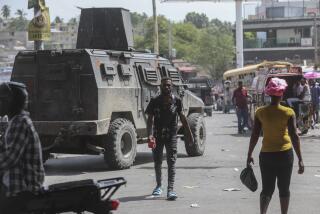U.N. Extends Angola Mission Despite Problems
- Share via
LUANDA, Angola — Sounding upbeat for the first time in months, United Nations officials and diplomats declared themselves satisfied Thursday after rebel UNITA forces surrendered only half the soldiers they had promised in order to meet a key deadline in Angola’s agonizingly slow peace process.
Officials said 8,278 UNITA troops had registered by midday at four demobilization camps in northern and central Angola. UNITA’s leader, Jonas Savimbi, had pledged to deliver 16,500 combatants and their weapons by Thursday, the first anniversary of the U.N. peacekeeping mission here.
Despite the shortfall, the U.N. Security Council voted Thursday for a three-month extension of the $1 million-a-day effort aimed at verifying implementation of a peace pact signed 15 months ago by the government of President Jose Eduardo dos Santos and Savimbi’s UNITA, the National Union for the Total Independence of Angola.
Until now, the accord to end two decades of murderous civil war has existed mostly on paper, with more than 1,500 cease-fire violations reported last year. A dozen small-scale military clashes were confirmed in the past two weeks, officials said.
But Khaled Yassir, deputy special representative of the U.N. operation here, told reporters that the long-delayed quartering of UNITA troops, a critical stage in the tenuous peace process, finally appears to be underway.
“Every day we see the number increasing,” Yassir said. He added: “I think we have to be optimistic.”
A senior Western diplomat agreed, saying, “There’s a general feeling the glass is half full. . . . In the last two weeks, we’ve begun to see real movement.”
Officials cautioned that many UNITA troops in the camps appear to be illegal “child soldiers” or members of ragtag village militias. In addition, most surrendered aging assault rifles or small antitank weapons. Only five artillery pieces and one tank were delivered.
More worrisome, only 119 pounds of ammunition were handed over, a tiny fraction of the amount expected.
Other major problems also remain. UNITA has submitted a list of 180 officials that it wants in the joint government and army envisioned in the peace accord. The list names up to 70 supposed UNITA generals, including eight four-star generals.
Dos Santos’ government, which has only one four-star general in its 100,000-member army, has rejected the list.
In addition, Savimbi still refuses to come to Luanda to meet Dos Santos, holing up instead in Bailundo, a UNITA-held town in the central highlands. Despite U.N. guarantees, Savimbi has told officials that he fears for his safety in the capital.
“We could have Savimbi here in a unity government in two months,” another senior Western official said earlier this week. “Or we could have another war in two months. It could go either way. We’re at an absolute crucial point.”
Officials cited other encouraging signs Thursday, however. Yassir publicly “congratulated” Angola’s government for releasing 353 prisoners of war--all that it held, according to the International Red Cross. UNITA has released 119 prisoners, nearly all in the last two weeks, but an unknown number are still in military stockades.
Citing the progress, the commission overseeing the cease-fire announced that four more demobilization camps will be open next week. A commission member said UNITA indicated that it will try to deliver about 32,000 troops--more than half its army--by the end of the month.
The Clinton administration maintains a tight watch and steady pressure on the shaky peace process here for more than humanitarian reasons: The war-torn nation in southwest Africa provides 7% of America’s imported oil.
In recent weeks, Madeleine Albright, the U.S. ambassador to the United Nations, and Brian Atwood, head of the U.S. Agency for International Development, have toured the country to meet officials from both sides of the conflict.
More to Read
Sign up for Essential California
The most important California stories and recommendations in your inbox every morning.
You may occasionally receive promotional content from the Los Angeles Times.













